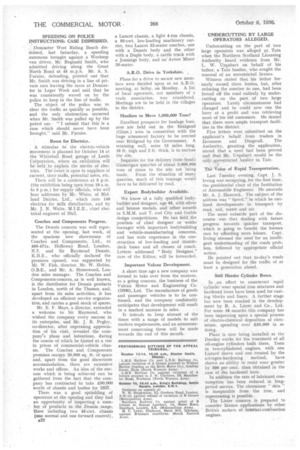• UNDERCUTTING BY LARGE OPERATORS ALLEGED.
Page 34

If you've noticed an error in this article please click here to report it so we can fix it.
Undercutting on the part of two large operators was alleged at .Tain when the Northern Scotland Licensing Authority heard evidence from Mr. L. W. Urquhart on behalf of his father, a Tain haulier, who-sought the renewal of an unrestricted licence.
Witness stated that his father formerly owned three lorries, but, after reducing the number to one, had been forced off the road entirely by undercutting on the part of two large operators. Lately circumstances had changed and he could now run the lorry at a profit and was retrieving most of his old customers. He denied that there were ample transport facilities in the district.
Five letters were submitted on the applicant's behalffrom traders in Inverness and Dingwall. The Authority, granting the application. stated that a need had been proved and that Mr. Urquhart would be the only unrestricted haulier in Tain.
The Value of Rapid Transportation.
Last Tuesday evening, Capt. J. S. Irving was occupying, for the first time, the presidential chair of the Institution of Automobile Engineers. He succeeds Mr. A. J. Hancock. The subject of the address was "Speed," in which he outlined developments in transport by road, rail, water and air.
The most valuable part of the discourse was that dealing with future progress towards quicker transport, which is going to benefit the human race by affording more leisure. Capt. Irving stressed the need for an intelligent understanding of the roads problem, followed by appropriate official action.
He pointed out that to-day's roads must be designed for the traffic of at least a generation ahead.
Still Harder Cylinder Bores.
In an effort to counteract rapid cylinder wear special iron mixtures and
hardened irons have been used for casting blocks and liners. A further stage has now been reached in the development by R. A. Lister and Co., Ltd. For some 18 months this company has been improving upon a special process of electro-chemical deposition of chromium, spending over £50,000 in so doing.
Plant is now being installed at the Dursley works for the treatment of all oil-engine cylinders built there. Tests in two-cylindered engines, with :one Listard sleeve and one treated by the nitrogen-hardening method, have shown an ability to resist wear greater by 300 per cent. than obtained in the case of the hardened bore.
In addition the rate of lubricant consumption has been reduced in longperiod service. The chromium " skin " is inseparable from the iron, and reprocessing is possible.
The Lister concern is prepared In consider licence applications by other British makers of internal-combustion engines.




























































































